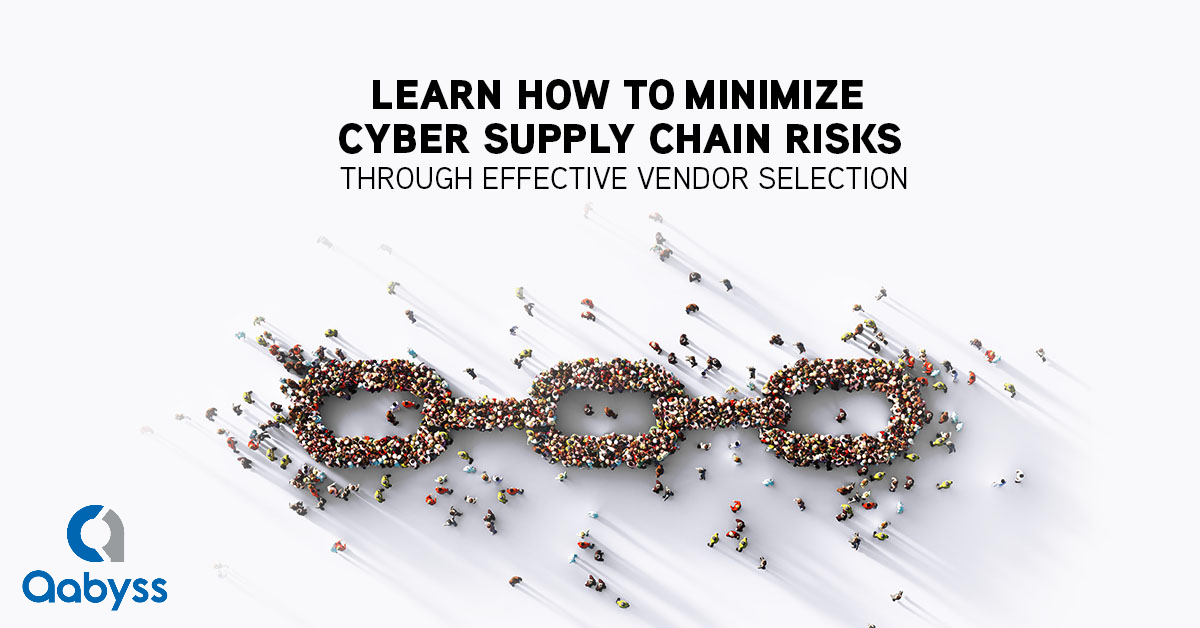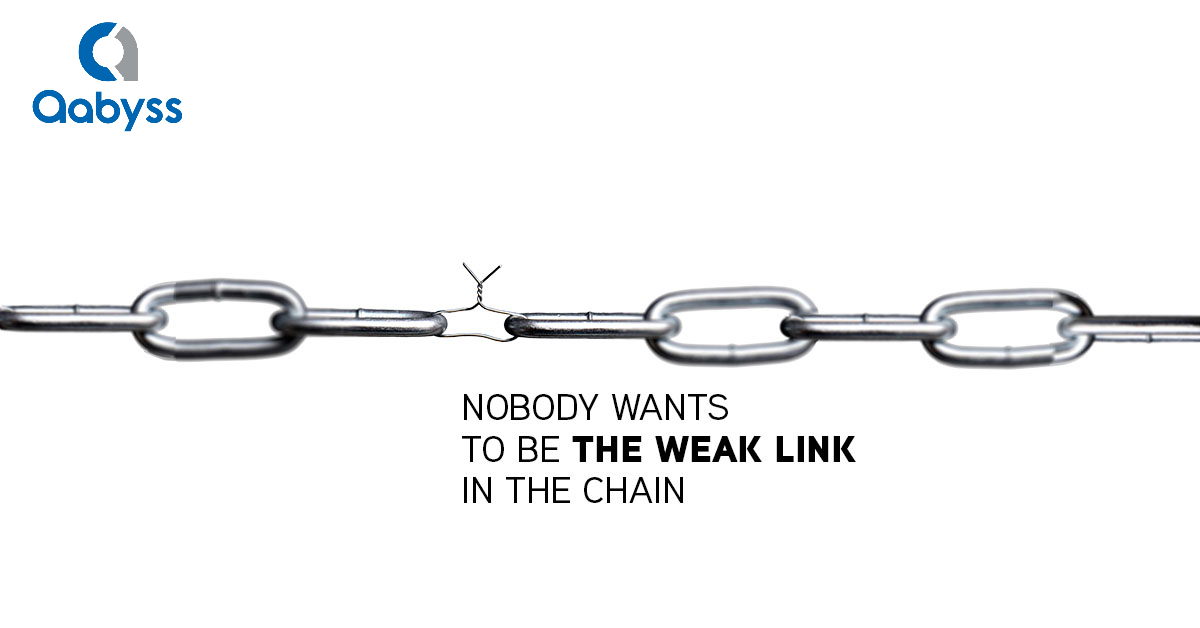Minimising Cyber Supply Chain Risks through Effective Vendor Selection.
Aabyss takes supply chain security very seriously, so in this blog, we will share with you specific measures to vet vendors and reduce potential risks.
As technology continues to evolve, so do the risks associated with it. For example, suppose your organisation uses third-party vendors to support its products and services. In that case, it needs to do its due diligence to ensure that they have the necessary security measures in place to protect against threats.
Always verify that the vendor has a solid record of safe operations and ask for evidence to support this. For example, could you check their policies for managing data and ensure they comply with cyber security regulations?
The vetting process must be non-negotiable. When a vendor is selected, the vendor's security posture should be checked to identify any potential weaknesses; this should include an audit of the vendor's systems, networks and data storage, as well as security practices, including employee training and incident response protocols.
You should establish contractual terms with the vendor that outline clear expectations for the security of its systems and networks and customer data handling. An external party should review the agreement regularly to ensure continued compliance with standards.
Only partner with vendors that meet your security needs and expectations.
By implementing these risk management measures and taking proactive steps to minimise cyber supply chain risk, organisations can gain peace of mind knowing that their vendor is doing its part in keeping their data safe and secure.
There are several key considerations to keep in mind when vetting potential vendors:
Security measures.
You need to understand your vendors' security measures before partnering with them. Therefore, discussing their security protocols and procedures with them would be best.
To keep your business safe, you should determine whether the vendor performs regular vulnerability scans, timely system updates and multi-factor authentication. This will help you determine whether the vendor can meet all your security expectations.
Multi-factor authentication, for example, adds an extra layer of security by requiring users to provide two or more independent credentials, such as a password and a security code sent to a user's mobile phone.
Vulnerability scans are also an essential part of any security protocol. A vulnerability scan is a process of identifying and assessing weaknesses in the system that could leave it vulnerable to attack. Companies should perform regular vulnerability scans to detect any potential security issues and take steps to mitigate them.
Propper training for staff on cyber security can help ensure that everyone is aware of the importance of cyber security and knows how best to protect their data. This can include setting strong passwords, avoiding phishing emails, and using secure access methods when working remotely.
Security certifications.
Businesses today need to be aware of the ever-evolving cyber security threat, and your vendors are no exception. Having the proper certification in place is essential for a secure environment.
Your vendor should be able to show certifications demonstrating compliance with industry security standards. This is significant because these certifications prove that the vendor has been independently assessed and meets security standards.
Vendors' security certifications should be closely evaluated to ensure they follow current industry standards. This includes tools such as ISO 27001
There are many security certifications to choose from, but regardless of which certificate you decide on, it is essential that your Government accredits it.
Data storage.
How and where does a vendor store your data? First, you must understand the storage details of your sensitive data, whether it's stored in the cloud, on-premises, or elsewhere.
This is critical because it will help determine whether the vendor will manage your data carefully and safeguard it against potential breaches.
You should pay close attention to data storage; data should be stored in reputable environments with access control and encryption measures. In addition, companies should evaluate their data retention policies and ensure that vendor data is appropriately restricted or discarded when no longer needed.
Data management.
Understanding what will happen to your data if the partnership ends is essential. Will it be deleted, stored for a while or transferred to another vendor?
Understanding whether third parties will have access to your data is critical. Just as you may outsource some tasks to a third-party vendor, they may outsource some tasks to a fourth-party vendor. So it's crucial to understand what they'll be sharing.
You should take a look at the vendors' data management practices. This includes data access controls, data handling processes and data backup models. Companies should also review their data security policies to ensure that their vendors meet the standard.
Business Continuity and Disaster Recovery (BCDR).
Organisations must move fast to minimise data loss and operational disruption when a cyber-attack or other disaster strikes. To do this, creating and maintaining an effective Business Continuity and Disaster Recovery (BCDR) plan is critical.
Please be sure to find out if your vendor has a BCDR plan. In the event of a disaster or a crisis, this will ensure that your critical data and systems will be available and recoverable. This will also ensure that your business operations continue smoothly, even during a crisis.
Investigate the vendor's business continuity and disaster recovery (BCDR) measures. Vendors should have well-defined plans to protect Against data loss and processes in place to quickly recover lost data in the event of a disaster or emergency.
Cyber liability insurance.
You need to know if your vendor has cyber liability insurance with increasing cyberattacks and data breaches. This insurance coverage will protect your business in the event of a worst-case scenario and will help ensure that your vendor can compensate you for any damages caused.
Organisations should also evaluate potential vendors' cyber liability insurance policies. This type of coverage can help minimise losses in the event of a successful cyberattack, as well as provide enhanced protection against legal liabilities.
How Aabyss can help.
Choosing the right vendor can be daunting, especially if you are trying to do it independently. It requires thorough research, careful consideration of all relevant factors and a clear understanding of your security needs and expectations. This is where an IT service provider like us can help.
We can assist in minimising cyber supply chain risks by evaluating and addressing vulnerabilities within your supply chain. We can also help manage vendor relationships and ensure that you collaborate with vendors that meet your security standards.
In summary, companies should take appropriate security measures when vetting vendors for supply chain risks. Adequate evaluation and verification of security certifications, data storage, data management, BCDR and cyber liability insurance are essential components of an effective vendor risk assessment program.
To guide you through evaluating potential vendors, we have created a checklist titled "Manage Supply Chain Risks with These Strategies." If you want to ensure your business is secure, please click the image below or on the top right-hand side of this post to download it and reach out to the Aabyss team for a consultation today.




Leave a Comment